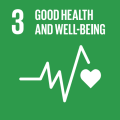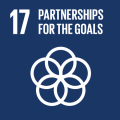The West African Ebola epidemic in 2013-2016 caused severe socioeconomic problems throughout the region. Over 28,000 cases and 11,000 deaths were reported at the end of the epidemic. The epidemic was not limited to rural communities but had also reached dense urban settlements, where people move with relative ease.
The epidemic in Sierra Leone spread from border towns close to Guinea which reported the first cases, to dense urban areas including Freetown, the capital city. The government of Sierra Leone, with the support of its partners (including the UK government), mobilised both material and human resources to respond to the epidemic. These efforts, which showcased the bravery and sacrifices of health and social workers, helped turned the tide against the disease and cases eventually started to fall.
At the end of the epidemic, it was clear that what was needed to better manage future health emergencies, like Ebola and most recently COVID-19, was a proactive and sustainable approach that improves the current fragile health systems and one which provides training and expertise relevant to the specific country. Additionally, there was also the need to further understand the West African Ebola epidemic to inform future public health policies and practices. My training and research at Imperial College London was effective in this.
My skills, knowledge and experience
My training in infectious disease epidemiology has helped me develop my ability to manipulate health data using statistical software, and I have learnt how to formulate research questions and write epidemiological reports for policymakers and publications. These skills have prepared me to provide support for future public health responses in Sierra Leone and the wider African continent. For instance, I was part of the MRC Centre of Global Infectious Disease Analysis team that provided real-time technical support to both local and international (e.g. FCDO) partners during the 2016-2018 Ebola epidemic in the Democratic Republic of the Congo.
Even more recently, as part of the Imperial College London COVID-19 Response Team, I have offered my expertise to support the COVID-19 response in Sierra Leone. A memorandum of understanding between Statistics Sierra Leone (an organisation which aims to create a viable National Statistical System to support evidence-based decision-making processes at both policy and planning levels) and Imperial College London is now in place to take this work forward. The work will include (but will not be limited to) estimating hospital bed, ventilation and oxygen support capacity. We will quantify the impact of non-pharmaceutical interventions and communicate the uncertainties in those estimates. Moving forward, the work will not only support the COVID-19 response but also seek to build country-level capacity. I plan to strengthen these collaborations on my return to Sierra Leone.
Techniques, patterns and data
My research has been just as exciting and useful as my training. Using geostatistical and machine learning techniques (i.e. techniques that learn patterns in data through space and time), I collated and analysed the large-scale datasets of the 2013-2016 West African Ebola epidemic. With these large-scale datasets, I predicted survival outcomes for Ebola cases with missing outcomes, adjusted the predictions for imperfections in the machine learning models, and re-estimated more representative estimates of Ebola case fatality ratios. I also identified and explored the relevant clinical and demographic predictors of Ebola case fatality ratios. These relevant predictors included age, fever, country of origin, and case classification among others.
Further analysis of the data was based on investigating spatiotemporal heterogeneity in Ebola case fatality ratios. The overarching aim of this analysis was to understand subnational variation in Ebola case fatality ratios, incorporating spatially correlated patterns not captured by the machine learning models. These research findings could inform future health planning and impact assessment. The geostatistical and machine learning approaches can be adapted to other infectious diseases (e.g. Coronaviruses, Dengue, and Zika viruses) using epidemiological analyses based on datasets with missing data.
Adapting as a researcher
The challenges and opportunities arising from my training and research can be viewed within the context of the ongoing global COVID-19 pandemic. The global pandemic has limited the possibility for researchers and policymakers to meet in person to share ideas and discuss the practical implications of their research. Some funders in the UK are beginning to question their research frameworks and strategies, and whether these adequately promote inclusion and diversity in the research community. Thankfully, platforms such as Zoom, Teams, and Skype are making this work easier as people now meet remotely even when they are geographically apart. Our ongoing collaboration with Statistics Sierra Leone is an example of such possibilities.
While my research gives more insight into the epidemiology of the West African Ebola epidemic, the COVID-19 pandemic, with its global geographical reach, is proving to be more challenging for the research community. Questions around COVID-19 still need to be answered, across academic disciplines, from its severity and transmissibility to the socioeconomic and governance issues affecting both country-level and global responses. I hope to continue to be part of the Sierra Leonean team contributing to answering these questions.




![Alpha_Forna_headshot[1] Headshot of Alpha Forna](https://cscuk.fcdo.gov.uk/wp-content/uploads/2021/02/Alpha_Forna_headshot1.jpg)
